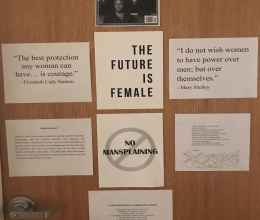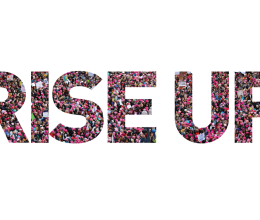“The future is female.”
“Feminism is for everybody.” (bell hooks)
“No mansplaining.”
Signs with messages like these used to hang on the doors of three prominent female prosecutors in the Third Judicial District Attorney’s Office. They were denouncements of sexism. They were declarations of solidarity with female survivors of violence they’d advocated for. They were messages of hope for achieving gender equity.
It didn’t matter that the term “no mansplaining” is in fact a rebuke of sexism and a humorous way of reminding men to respect women’s expertise. It didn’t matter that just a day before the elected District Attorney, Mark D’Antonio, had complimented Rossi on her “proud displays of feminism.” And it didn’t matter that prior to the incident, all three women had endured and raised concrete instances of harassment and sexism to Human Resources. All that mattered was that Byers wanted the signs removed at once.
"By this time, all three women had already endured rampant sexism, harassment, and retaliation. They weren’t about to give up their First Amendment right to speak out against it."
More Work, Less Pay
"...the salary she was offered was five thousand dollars less than four other men who had substantially less experience than her and who were hired around the same time for parallel positions."
Harassment and Retaliation
"My role was circumscribed to being the pretty lady at the table and then the sweet, nurturing female attorney...It was humiliating."
Taking a Stand
"The ACLU is fighting to obtain justice for Brulotte, Duffin, and Rossi at a critical moment as our country reckons with the reality of enduring and pervasive sexism and sexual abuse in the workplace."








